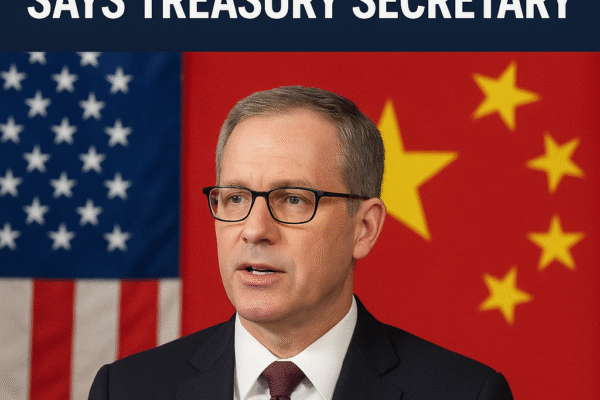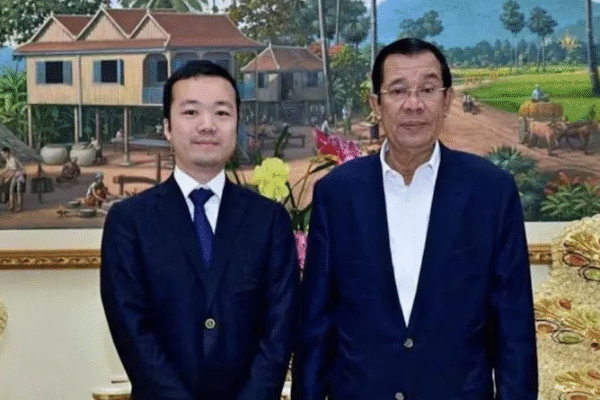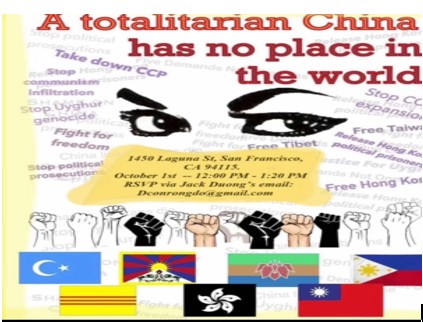
Category: Americas

Controversial Zohran Mamdani: Redefine—or Ruin—New York amid uncertain global times
Zohran Mamdani’s socialist rise to New York City’s mayoralty sparks fierce debate. Can his radical promises survive the realities of governance amid Trump’s clash with China and a shifting global order?
RFA suspends remaining editorial operations amid funding uncertainty
Protective measures taken with hope of rebuilding news operations in future WASHINGTON – With the government shutdown and delay in receiving funding for the new fiscal year, effective Oct. 31, Radio Free Asia (RFA) will halt all production of news content for the time being. The move is part of a plan for the Congressionally-funded private corporation to implement cost-saving measures that can help sustain the organization should appropriated funding streams resume. President and CEO Bay Fang issued the following statement: “Because of the fiscal reality and uncertainty about our budgetary future, RFA has been forced to suspend all remaining news content production – for the first time in its 29 years of existence. In an effort to conserve limited resources on hand and preserve the possibility of restarting operations should consistent funding become available, RFA is taking further steps to responsibly shrink its already reduced footprint. “This means initiating a process of closing down overseas bureaus and formally laying off furloughed staff and paying their severance – many of whom have been on unpaid leave since March, when the U.S. Agency for Global Media unlawfully terminated RFA’s Congressionally appropriated grant. “However drastic these measures may seem, they position RFA, a private corporation, for a future in which it would be possible to scale up and resume providing accurate, uncensored news for people living in some of the world’s most closed places.” During its tenure, RFA’s groundbreaking reporting on the Uyghur genocide in Xinjiang, the CCP’s cover-up of COVID-19 fatalities, the unfolding crisis in Myanmar since the 2021coup, Chinese hydropower projects in the Tibetan regions, and the journeys of North Korean defectors has built a public record of transparency in some of the world’s most repressive places, holding autocrats and elites accountable to their people and internationally. Other measures to conserve resources on hand include ending leases of overseas offices and bureaus in Dharamsala, Taipei, Seoul, Istanbul, Bangkok, and Yangon. In the last five years, RFA created new editorial units focused on China’s malign influence in the Indo-Pacific region and globally, investigating PRC secret police stations in the United States and Europe, election interference by the Chinese Communist Party in Taiwan and other Asian countries, and PRC influence operations in Pacific island countries. RFA’s incisive brand of journalism has made it and its journalists a constant target, with its reporters facing pressure and threats since its inaugural report in Mandarin was heard in China on Sept. 29, 1996. Authorities in China, Vietnam, Myanmar, and Cambodia have detained family members, sources, reporters, and contributors. Listeners in North Korea have been severely punished and reportedly executed for accessing RFA’s reports. Nevertheless, RFA’s journalistic operations have until now withstood government intimidation and attacks. In the months since the USAGM illegally terminated its Congressionally appropriated grant to RFA, and despite layoffs and furloughs that diminished editorial staff by more than 90%, the private grantee has continued to fulfill its Congressional mandate to provide accurate, timely news to people living in some of the most closed media environments in Asia thanks to a preliminary injunction issued by the United States Federal District Court for the District of Columbia, which USAGM has appealed. RFA has also continued to win awards for its reporting, including two national Edward R. Murrow awards in August and a Gracie Award in March. While many services, including RFA Uyghur and Tibetan, have already gone dark, others have continued to produce limited output, including RFA Burmese, Khmer, Korean, Mandarin Chinese, and Vietnamese. But these will cease on Oct. 31. We are : Investigative Journalism Reportika Investigative Reports Daily Reports Interviews Surveys Reportika

U.S. and China Poised to Avert 100% Tariff as Trump-Xi Meeting Nears, Says Treasury Secretary
The U.S. and China appear close to averting a 100% tariff showdown after Treasury Secretary Scott Bessent said a “substantial framework” has been reached. Trump and Xi are expected to meet this week in South Korea to finalize details of the deal.

US, UK sanction Cambodian conglomerate, alleging role in scam networks
The U.S. and British governments on Tuesday announced a sweeping crackdown on cyber-scam networks in Southeast Asia accused of luring workers with fraudulent job ads or fake romantic relationships, forcing them to extract billions from people across the world through a range of deceptions, then laundering the money they received.

Turkey Weighs Rare-Earth Partnership with U.S., Marking Strategic Shift Away from China and Russia
Turkey is exploring a strategic partnership with the U.S. to develop rare-earth deposits in Beylikova, signaling a major shift from previous talks with China and Russia. The deal could strengthen Ankara’s role in global critical mineral supply chains.
Hong Kong, parts of southern China shut down ahead of typhoon
Residents and businesses hunkered down in Hong Kong and at least 10 cities in southern China on Tuesday as Super Typhoon Ragasa, the most powerful tropical cyclone of the year, barreled toward land. Authorities urged residents to stay in their homes, where people taped up windows to protect against high winds. Supermarket shelves emptied in some areas as panicked residents stocked up on supplies. Residents in Hong Kong stock up on supplies at a supermarket to prepare for the approaching Typhoon Ragasa on Sept. 22, 2025.(Tyrone Siu/Reuters) Packing winds of up to 220 km per hour, or 137 miles per hour, Ragasa is expected to pass around 100 km to the south of Hong Kong on Wednesday, the Hong Kong Observatory reported just before 1 a.m. local time. Residents should prepare for “heavy squally showers and thunderstorms” and “overtopping waves over the shoreline,” particularly on the eastern and southern coasts, the Observatory said. A reporter for Agence France-Presse saw waves nearly five meters high crash into the seaside promenade of the city’s Heng Fa Chuen residential district around nightfall. The storm is expected to make landfall from midday to late Wednesday along the coast of Guangdong, where authorities evacuated more than 770,000 people, according to state broadcaster CCTV. On Monday, Ragasa tore through the northern Philippines, where thousands sought shelter in schools and evacuation centers. In Taiwan, officials said that 30 people were missing in the eastern county of Hualien, where a barrier lake in the mountains burst as Ragasa stormed through. Includes reporting from Agence France-Presse and Reuters. We are : Investigative Journalism Reportika Investigative Reports Daily Reports Interviews Surveys Reportika

Protest Rally Against China Planned in San Francisco on October 1, 2025
On Oct 1, 2025, a protest rally will be held in front of the Chinese Consulate in San Francisco. Organized by rights groups, it will spotlight China’s repression of Uyghurs, Tibetans, Hong Kongers, and Inner Mongolians, and oppose CCP expansionism.
Analysis: Nepal’s protests are being closely watched in Vietnam
RFA Perspectives — Nepal’s streets have exploded in protest. Thousands of young people, angered by a government ban on social media, are standing up against corruption and inequality. In Vietnam, the youth are watching closely, because Nepal’s story feels eerily familiar. Video: Why Vietnam is paying attention to the protests in NepalWhy Vietnam cares So why are Vietnamese youth paying attention to what’s happening in Nepal? Because Nepal’s uprising highlights struggles they know all too well. Censorship, corruption, unemployment, and the communist party – these challenges echo in both societies. For Vietnam’s younger generation, Nepal’s story is not only a warning, but also a source of reflection and, perhaps, inspiration. Social media control The protest in Nepal was triggered by the state’s decision to block social media platforms, including Facebook, WhatsApp, and YouTube. In Vietnam, social media is tightly monitored, with posts taken down and activists punished. For both countries, digital spaces aren’t just entertainment; they are lifelines for free expression and e-commerce. When governments try to silence them, the youth push back. Protesters take selfies and celebrate at the Singha Durbar, the seat of Nepal’s government’s various ministries and offices, after it was set on fire during a protest against social media ban and corruption in Kathmandu, Nepal, Sept. 9, 2025.(Niranjan Shrestha/AP) When a fellow communist party-led system shows cracks, it challenges the narrative that Vietnamese citizens have heard for decades. In both countries, young people feel decisions are made without them, and often at their expense. In closing As Nepal’s protests unfold, Vietnamese youth are watching with interest. The events in Nepal may not predict Vietnam’s future, but they highlight questions many young people across Asia are asking today. We are : Investigative Journalism Reportika Investigative Reports Daily Reports Interviews Surveys Reportika

U.S. House passes Uyghur Policy Act supporting victims of persecution by China
WASHINGTON — The House passed the Uyghur Policy Act on Tuesday, a bill that advances a strategy for the United States to support Uyghurs and other ethnic minorities enduring persecution at the hands of China’s government.


